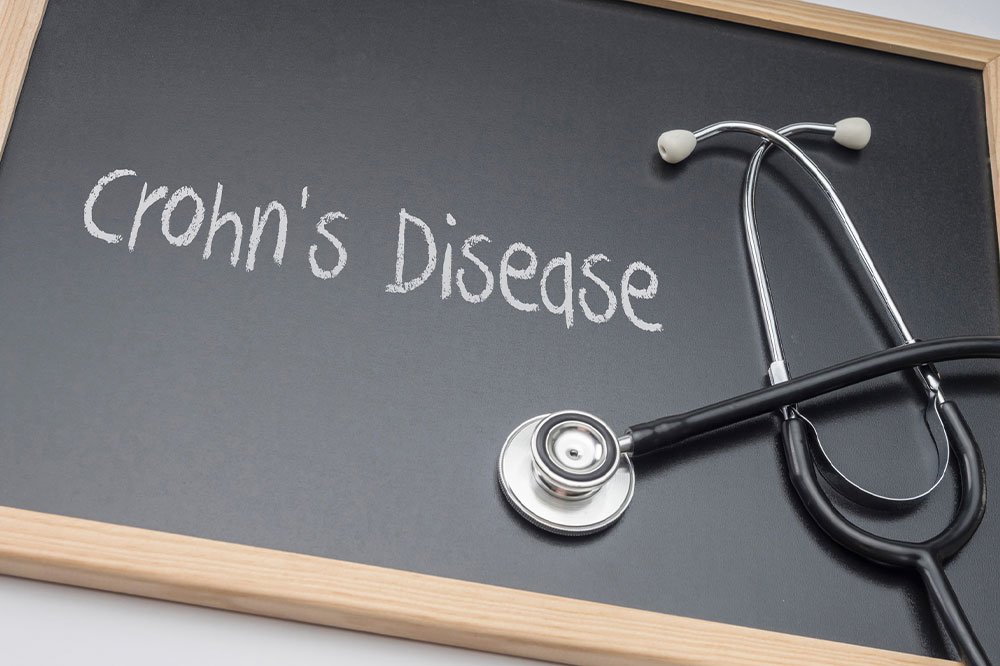Symptoms, Types, and More About Crohn’s Disease
Crohn’s disease, commonly known as regional enteritis or ileitis, is an inflammatory bowel disease (IBD) that causes swelling and irritation of the digestive tract. Its symptoms include stomach cramps, diarrhea, loss of weight, and rectal bleeding. It is a chronic condition with no cure; however, treatments for Crohn’s disease help manage the symptoms and enable one to live a healthy life. This article discusses the condition’s symptoms, types, treatments, and risk factors.
Symptoms of Crohn’s disease
Crohn’s disease symptoms frequently appear gradually. Some signs may also worsen with time. Although it is possible, it is uncommon for symptoms to appear suddenly and rapidly.

As the condition advances, the symptoms of Crohn’s disease may worsen. More severe symptoms may include a perianal fistula, resulting in pain and leakage near your anus, ulcers that appear everywhere on the body, from the mouth to the anus, inflammation of the skin and joints, and anemia, which causes breathlessness or a reduced ability to exercise.
Types of Crohn’s disease
Crohn’s condition can attack several areas of the digestive tract.
Ileocolitis
It is an inflammation of the small intestine and a portion of the large intestine, also known as the colon. The most frequent kind of Crohn’s disease is ileocolitis.
Ileitis
Inflammation and swelling of the small intestine (ileum) is known as ileitis.
Gastroduodenal
In this type, the stomach and the top of the small intestine are affected by inflammation and irritation.
Jejunoileitis
This type is characterized by developing patchy regions of inflammation in the upper portion of the small intestine (called the jejunum).
Basic treatment guide for Crohn’s disease
There is no cure for this disease, and no single treatment works for everyone. One purpose of prescription treatment for Crohn’s disease is to lessen the inflammation that causes your symptoms. Another objective is to improve long-term prognosis by reducing complications. This could result in symptom reduction and long-term remission in the best-case scenario.
Anti-inflammatory prescriptions
During first-line therapies for inflammatory bowel disease, anti-inflammatory options are usually considered. They are as follows:
Immune system suppressors
This treatment type also lowers inflammation; however, it affects your immune system, creating inflammatory molecules. For some people, a combination of these is more effective than either option alone. Immune system suppressors include the following:
Immunosuppressants
They are a few common immunosuppressants used to address inflammatory bowel disease. Using this treatment type necessitates close monitoring with your specialist and regularly checking your blood for adverse effects such as decreased resistance to infection and liver inflammation.
Biologics
This type of therapy targets proteins produced by the immune system. The treatment for Crohn’s disease basically slows down or stops inflammatory damage.
Antibiotics
Antibiotics can lower the amount of discharge from fistulas and abscesses and, in some cases, heal them in Crohn’s disease patients. Some experts believe that this remedial option aids in the reduction of dangerous intestinal bacteria, which may have a part in activating the intestinal immune system, resulting in inflammation.
Surgery
If food and lifestyle modifications, prescription treatments, or other therapies do not alleviate your symptoms, your physician may consider surgery. Nearly half of Crohn’s disease patients will need one operation. Surgery, however, does not heal Crohn’s disease, it only helps manage the symptoms better.
The various treatment methods and approaches used to manage Crohn’s disease vary from case to case and are decided upon by specialists after studying a patient’s symptoms and overall case history. It is advisable to consult a doctor to know what remedial method would be best for you.
Who is susceptible to Crohn’s disease?
There are several factors that can increase one’s chances of developing Crohn’s disease. Read on to know more about them:
You are more vulnerable to the condition if there is a family background of the disease. Essentially, you are more likely to get affected by Crohn’s disease if you have a parent, child, or sibling who has it.
The use of tobacco is likely to increase your chances of having Crohn’s disease.
Prescription options, including birth control treatments, antibiotics, and options such as aspirin or ibuprofen may raise your chances of having Crohn’s disease slightly.
If your meals are rich in fat content, you may be at higher risk of developing the condition.
It might be challenging to live with Crohn’s disease at times. Unexpected flare-ups and routine checkups with a professional healthcare team might cause disruptions in schooling, job, and social activities. However, if the symptoms are effectively managed using a proper treatment guide for Crohn’s disease, you could lead a full life with the illness.

